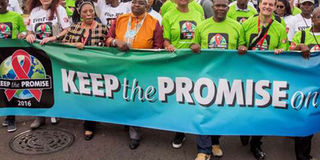‘Lucky few’ may hold key to Aids cure, say scientists

Aids activists march through the streets of Durban on July 16, 2016. Kenya is fourth in terms of Aids prevalence. PHOTO | AFP
What you need to know:
- These are people exposed to the Aids virus continually but are not infected and are known scientifically as HIV-exposed seronegative individuals, or HESNs.
Scientists have intensified their interest in the “lucky few” in their quest to develop a vaccine and possible functional cure for Aids.
These are people exposed to the Aids virus continually but are not infected and are known scientifically as HIV-exposed seronegative individuals, or HESNs.
Commercial sex workers and one of the parties that make up discordant couples — who have unprotected sex with HIV-positive people but do not get sick — may hold answers to an Aids cure.
The scientists, mainly specialising in viruses (virology) and diseases and their infection patterns (epidemiology), presented their research findings at a HIV conference in Nairobi.
Most papers investigated the uniqueness of the immune systems of the “lucky few”.
The success of these studies would save Kenya a lot of money.
Dr Martin Sirengo, head of National Aids and STI Control Programme (Nascop), said there were more than 950,000 Kenyans on ARVs.
Kenya is fourth in terms of Aids prevalence and the National Aids Control Council says 1.6 million Kenyans are HIV-positive.
Prof Omu Anzala, director of University of Nairobi’s Kenya Aids Vaccine Initiative-Institute of Clinical Research (KAVI-ICR), explained that HESNs are categorised into exposed seronegatives, who get exposed to the virus but do not get infected, and elite controllers, who are infected with the virus but do not need drugs to survive.





